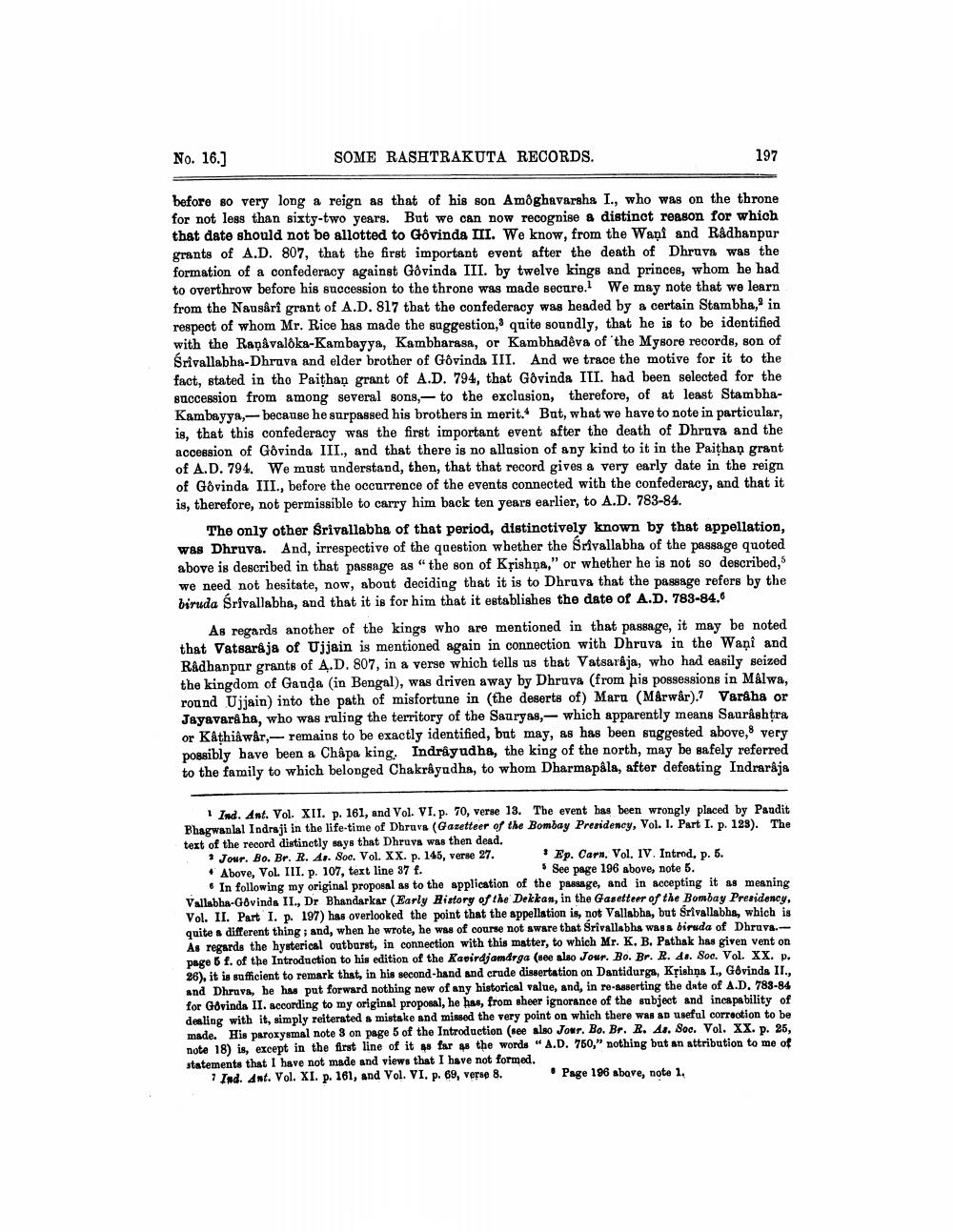________________
No. 16.)
SOME RASHTRAKUTA RECORDS.
197
before so very long a reign as that of his son Amôghavarsha I., who was on the throne for not less than sixty-two years. But we can now recognise a distinct reason for which that date should not be allotted to Govinda III. We know, from the Wani and Radhanpur grants of A.D. 807, that the first important event after the death of Dhruva was the formation of a confederacy against Govinda III. by twelve kings and princes, whom he had to overthrow before his succession to the throne was made secure. We may note that we learn from the Nausâri grant of A.D. 817 that the confederacy was headed by a certain Stambha, in respect of whom Mr. Rice has made the suggestion, quite soundly, that he is to be identified with the Raņávalóka-Kambayya, Kambharasa, or Kambhadêva of the Mysore records, son of Srivallabha-Dhruva and elder brother of Govinda III. And we trace the motive for it to the fact, stated in the Paithan grant of A.D. 794, that Govinda III. had been selected for the succession from among several song,- to the exclusion, therefore, of at least StambhaKambayya,- because he surpassed his brothers in merit. But, what we have to note in particular, is, that this confederacy was the first important event after the death of Dhruva and the accession of Govinda III., and that there is no allasion of any kind to it in the Paithan grant of A.D. 794. We must understand, then, that that record gives a very early date in the reign of Govinda III., before the occurrence of the events connected with the confederacy, and that it is, therefore, not permissible to carry him back ten years earlier, to A.D. 783-84.
The only other Srivallabha of that period, distinctively known by that appellation, was Dhruva. And, irrespective of the question whether the Srivallabha of the passage quoted above is described in that passage as "the son of Kộishna," or whether he is not so described, we need not hesitate, now, about deciding that it is to Dhruva that the passage refers by the biruda Śrivallabha, and that it is for him that it establishes the date of A.D. 783-84.
As regards another of the kings who are mentioned in that passage, it may be noted that Vatsargja of Ujjain is mentioned again in connection with Dhruva in the Waņi and Radhanpur grants of A.D. 807, in a verse which tells us that Vatsaraja, who had easily seized the kingdom of Ganda (in Bengal), was driven away by Dhruva (from his possessions in Málwa, round Ujjain) into the path of misfortune in the deserts of) Maru (M&rwår). Vardha or Jayavardha, who was ruling the territory of the Saury88,- which apparently means Saurashtra or Kathiâwâr - remains to be exactly identified, but may, as has been suggested above, very possibly have been a Chapa king. Indrayudha, the king of the north, may be safely referred to the family to which belonged Chakrayadha, to whom Dharmapala, after defeating Indraraja
1 Ind. Ant. Vol. XII. p. 161, and Vol. VI. p. 70, verse 13. The event has been wrongly placed by Pandit Bhagwanlal Indraji in the life-time of Dhruva (Gazetteer of the Bombay Presidency, Vol. 1. Part I. p. 129). The text of the record distinctly says that Dhruvs was then dead. Jour. Bo. Br. R. 4.. Soc. Vol. XX. p. 145, verse 27.
Ep. Carn. Vol. IV. Introd, p. 5. • Above, VOLIII. p. 107, text line 87 f.
See page 196 above, note 5. . In following my original proposal as to the application of the passage, and in accepting it ss meaning Vallabhs-Govinda II., Dr Bhandarkar (Early History of the Dekkan, in the Gasetteer of the Bombay Presidency, Vol. II. Part I. p. 197) has overlooked the point that the appellation is not Vallabha, but Srivallabhs, which is quite a different thing i and, when he wrote, he was of course not aware that Srivallabha wasa biruda of Dhruva.-- As regards the hysterical outburst, in connection with this matter, to which Mr. K. B. Pathak has given vent on page 6 f. of the Introduction to his edition of the Kapirdjamdrga (ne slao Jour. Bo. Br. R. ds. Soc. Vol. XX. p. 26), it is sufficient to remark that, in his second-hand and crude dissertation on Dantidurga, Krishna I., Govinda II., and Dhruva, he has put forward nothing new of any historical value, and, in ro-serting the date of A.D. 788-84 for Govinda II. according to my original proposal, he has, from sheer ignorance of the subject and incapability of dealing with it, simply reiterated a mistake and missed the very point on which there was a useful correction to be made. His paroxysmal note 3 on page 5 of the Introduction (see also Jour. Bo. Br. R. 43. Soe. Vol. XX. p. 25, note 18) is, except in the first line of its far as the words "A.D. 750," nothing but an attribution to me of statements that I have not made and views that I have not formed. 7 Ind. Ant. Vol. XI. p. 161, and Vol. VI. p. 69, verse 8.
Page 196 above, note 1.




